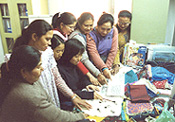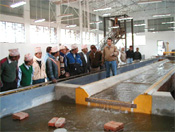 General Introduction of Japan's ODA to Nepal General Introduction of Japan's ODA to Nepal
|
Japan started its economic cooperation to Nepal with a modest technical assistance which was provided in the form of services of technical experts. It has been a privilege to Japan to participate in the economic development programmes of Nepal since 1952, the year Nepal joined the Colombo Plan. Capital and financial assistance started soon after the opening of the Embassy in Kathmandu in 1968. We are happy to know that at present Japan is one of the top donors to Nepal in its all and involved in all important sectors of economy. Until JFY 2000, the Government of Japan has provided to Nepal a total assistance of  249.834 Bil that constitutes grants ( 249.834 Bil that constitutes grants ( 141.344Bil), loans ( 141.344Bil), loans ( 63.889Bil) and Technical Assistance ( 63.889Bil) and Technical Assistance ( 44.601Bil) in various fields. In the fiscal year 2001, the grant assistance totaled 44.601Bil) in various fields. In the fiscal year 2001, the grant assistance totaled  9.857 Bil (US$76.26 mil Approx. based on exchange rate of March 8, 2002). 9.857 Bil (US$76.26 mil Approx. based on exchange rate of March 8, 2002).
On the basis of various studies and researches concerning development conditions and tasks and development plans in Nepal, as well as policy dialogues between Japan and Nepal, Japan has given priority to assistance in the following five areas:
|
 Design Instruction for Nepalese Art Craft at ACT by JOCV
Design Instruction for Nepalese Art Craft at ACT by JOCV
|
Human Resources Development: For a developing country like Nepal, it is important to strengthen the human resources so that they can be effectively mobilized in the country's nation-building efforts. To this end, Japan provides technical cooperation to Nepal that includes personnel exchange under the JICA training programs, dispatch of experts, senior volunteers and JOCVs. Until 2000, JICA has sent more than 1,200 experts to Nepal and accepted more than 2,800 trainees.
|
|
Social Sector: Social sector has been one of the priority areas for Japan's ODA in Nepal. Assistance has been provided to Tribhuvan University Teaching Hospital, National Tuberculosis Center, Kanti Children's Hospital, etc. Assistance in family planning as well as primary health care, including maternal and childcare, is considered important.
|
 Kanti Children Hospital
Kanti Children Hospital
|
Agricultural Development: Since 1977, Japan has been providing assistance in such areas as improving agricultural infrastructure, as well as development and diffusion of agricultural production technologies. The assistance has contributed significantly to the increase in employment opportunities and to raise the income of low-income farmers. Starting with the cooperation in Janakpur Agriculture Development Project (JADP), Japanese assistance has been valuable in the field of Horticulture, Fisheries and Sericulture.
Economic Infrastructure: Japan attaches importance to the improvement of basic infrastructure, such as in areas of power generation, roads, bridges, water supply facilities, telecommunications, etc. The construction of Sindhuli Road is expected to greatly influence the economic activity of the common people. Japan has also provided extensive loan assistance to Nepal such as for the Kulekhani (I and II) Hydro-power Station, Kali Gandaki 'A' Hydroelectric Station, Udaypur Cement Industry and Melamchi Water Supply Project.
|
 Hydraulic Laboratory at Godawari,
Hydraulic Laboratory at Godawari,
Disaster Mitigation Support
Programme Project
|
Environmental Conservation: Proper utilization of natural resources for environmental improvement is neccesary. Towards this end, Japan has extended assistance for the implementation of Disaster Mitigation Support Project, for the implementation of Community Development and Forest/Watershed Conservation Project, and for the studies on Fewa Lake in Pokhara and earthquake.
The Japanese taxpayers are becoming more and more conscious of the effectiveness as well as efficiency of our ODA activities abroad so as to meet the real needs of each recipient country in socio-economic development and, in
|
particular, reducing the poverty. Therefore, the Government of Japan, as part of its reform efforts, places more importance on the efficiency, effectiveness, and transparency of its ODA programs. To this end, the Government of Japan expects ownership, or self-help efforts, on the part of the recipient Government, and participation by the all circles concerned including the communities and local authorities in the nation-building efforts.
NGO Activities: The Japanese non-Governmenta organizations are actively dedicating to the enhancement of the welfare of the Nepali people. Their numbers exceed more than one hundred. Let us introduce, among them, just a few: Save the Children/Japan, Shaplaneer, Mustang Development Service Association, AMDA Japan, etc.
Related Informations:
|
|
|
|

